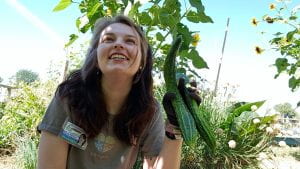Elissa Corless, Environmental Humanities Major, talks about their internship working with incarcerated youth

Harvesting cucumbers to distribute amongst friends, family, and neighbors. Check out our open garden hours on WWV Farm to School social media or website pages to come take home your own produce and see what’s growing!
“Hello all, my name is Elissa and I’m a student completing my degree in Environmental Humanities at Whitman this fall. Before my time here ends, I wanted to make the most of the unique resources we have access to at this institution in order to address community needs. This summer I returned to Walla Walla Valley Farm to School, our local garden education program through the Sustainable Living Center, to develop and teach lessons to incarcerated youth in the community. Embarking on my internship at the Juvenile Justice Center (JJC), I set out with a clear mission: to bring essential life skills and sustainability education to the youth. Little did I know that this journey would be as transformative for me as it would be for those I aimed to help.
Each day at the JJC has been both challenging and fulfilling. I prepared curriculum weekly and coordinated ongoing projects, finding ways to work around the constraints of incarceration to provide impactful lessons for the youth despite their circumstances. I came into the program with a mindset of bringing the garden to them, since most weeks the youth couldn’t leave the facility. The approach that worked best was allowing the youth to familiarize themselves with the process of planning and preparing a garden by doing as much as possible themselves. The kids selected seeds they were interested in while discussing companion planting and different uses for the produce. They started their selections in recycled containers I could easily transport back and forth, so they could check their progress weekly.
Some of the teens were excited about having an herb garden, so we fashioned a planter from salvaged burlap sacks. They sowed rosemary, thyme, sage, lavender, cilantro, and mint- all completed in the indoor classroom- and the burlap sacks made it simple to carry outside. It seemed like an impossible task, to give these kids an authentic gardening experience without setting foot outdoors, but each week I noticed them picking up the same knowledge and skills any child in the other Farm to School programs would have.
The impact of our gardening lessons was evident in the group’s engagement. They embraced the possibility of selling food or houseplants, growing microgreens, donating extra produce, and even nurturing bonsai trees from seeds. Witnessing their curiosity and enthusiasm throughout the process, from seed selection to recording observations in their garden journals, was all truly heartening.

Squash and cucumber harvest at the Pride Garden, located at Children’s Home Society of Walla Walla. Pride garden activities take place following Triple Point meetings, a weekly support group for LGBTQ youth ages 13-18. Updates on what we are up to can be found on @wwpridegarden on Instagram.
Beyond the JJC gardening sessions, I spent time on other programming and garden maintenance, such as weekly Pride Garden sessions. These additional activities have helped me to recognize areas of need for at-risk youth in Walla Walla, and Farm to School has provided me opportunities to discuss with other community members how we might better address these needs.
Throughout my internship, I have come to a significant realization: this program’s success lay in working with the restrictions imposed by the justice system, rather than trying to circumvent them. Understanding this, I began envisioning a slightly different type of garden program at JJC in collaboration with my program partner, Nathan, who is our local expert on all things hydro/aquaponics. After research and discussion, I firmly believe the most successful way to bring the garden to incarcerated youth would be through hydroponics, a consistent and sustainable method of growing that can be done entirely indoors.
This hydroponics system would offer youth a chance to learn to grow their own food while having consistent access to the plants, providing invaluable skills and a sense of ownership over their growth process, as opposed to the degree of separation growing in the garden bed creates due to lack of outdoor privileges. Depending on system productivity, we could donate or sell the harvest, benefitting their youth rehabilitation programs and even supporting community initiatives.
My experiences at JJC have been an enriching part of my Whitman career, merging my passion for sustainability education with the pursuit of social justice. Moving forward, I aim to continue nurturing the program in the fall and spring, resources permitting, with the hope of passing the torch to future student interns. I’ve gathered resources, established community contacts, and laid the groundwork for the program to be run and developed further in my absence.
I am hopeful that this garden initiative will become a permanent and thriving part of the JJC, so it can serve to empower many more vulnerable kids. By providing youth with sustainable food-growing skills, Walla Walla Valley Farm to School is sowing the seeds of positive change that will extend far beyond the confines of the justice system.”